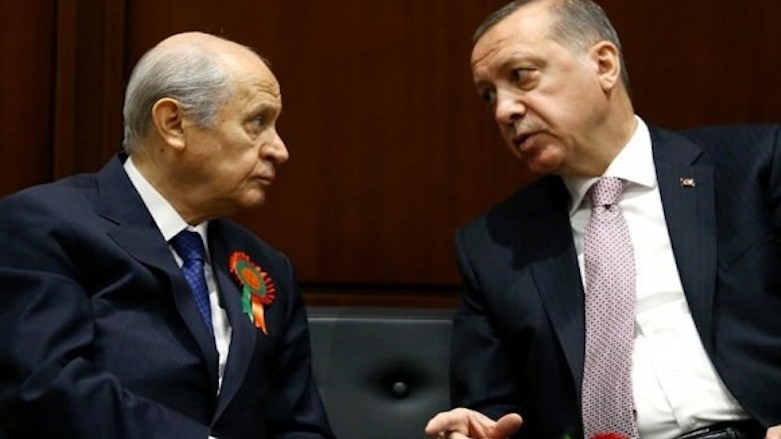Erdogan's right-wing alliance collapses amid spat over amnesty, student oath
"If there is anyone who says I am a PKK member, a separatist, and I work for Kurdistan, they should know there is punishment and will have to bear the consequences."

ERBIL (Kurdistan 24) - A parliamentary alliance between Turkish President Recep Tayyip Erdogan's Islamist-rooted party and the leading faction of ultra-nationalists crumbled on Tuesday after a week of intense disputes over a proposed amnesty for non-political prisoners and a defunct student oath that critics deem racist.
During a day filled with party leaders' weekly speeches in Ankara, head of the Nationalist Movement Party (MHP) Devlet Bahceli first said there was no more "People's Alliance," a coalition he had forged ahead of elections earlier this year with Erdogan's Justice and Development Party (AKP).
The breakdown of the alliance is unlikely to affect Erdogan's strong grip on power, at least for this political term, as he successfully managed to introduce the executive presidential system in a referendum last year with the support of the MHP that saw the overturning of the country's decades-old parliamentary system of governance.
Erdogan had earlier labeled calls for an amnesty as one for drug-sellers that numbered some 50 thousand. Though he did not name those connected to his junior political partner explicitly, the apparent reference appeared clear to many.
In response, Bahceli wrote on Twitter that Erdogan's words were targeting his party and leaving it with "smears of narcotic crimes."
There are even more political prisoners serving time in Turkish prisons charged with terrorism, some seven thousand of them Kurdish detainees including former pro-Kurdish Peoples' Democratic Party (HDP) Co-chair Selahattin Demirtas, nine lawmakers, and over 60 mayors.
The other major sticking point that effectively ended the MHP-AKP alliance was a decision by a top court that ruled to re-instate the Student Oath, a short pledge of allegiance that all primary school students across the country were required to read out loud each morning before classes.
The oath is reminiscent of the strongly ethno-centric and fascistic early decades of the Turkish Republic under the rule of its founder Mustafa Kemal Ataturk and it forced each student, regardless of their background, to say he or she is a Turk.
"My existence shall be dedicated to the existence of the Turk," the oath reads.
That practice was annulled in 2013 at a time when then Prime Minister Erdogan was taking part in the ultimately unsuccessful secret peace talks with the outlawed Kurdistan Workers' Party (PKK) leadership and Kurdish representatives in Ankara.
Bekir Bozdag, a leading figure in Erdogan's administration, objected to the Council of State court's decision, saying it exceeded its constitutional authority, to which Bahceli responded by personally attacking him.
"If there is anyone who says I am a PKK member, a separatist, and I work for Kurdistan, they should know there is punishment and will have to bear the consequences. Mr. Bozdag should be very careful about this," the MHP leader wrote.
Bozdag is from Yozgat Province in central Anatolia where hundreds of Kurdish villages and several Kurdish towns are located, but the former Justice Minister has never publicly acknowledged his Kurdish background.
It was Erdogan who revealed it in 2017 at a conference while making a point about how identities "did not matter" in his government.
On Tuesday, Erdogan defended Bozdag and said that, if the oath was brought back, non-Turkish peoples in the country would feel more attached to their own identities.
"His roots might be Kurdish but he does have the sense of duty to this nation."
Editing by John J. Catherine